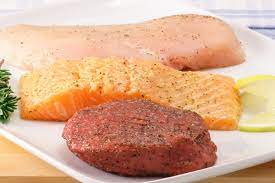
How to get protein without the meat.
Share
Eating protein doesn't have to mean eating meat, and there's growing evidence that replacing animal proteins with more plant-based proteins can benefit your health. These (mostly) vegetarian foods are high in protein and heart-healthy too.
1. Pulses
- high in fibre and a source of iron. They are part of the legume family and include all beans, peas and lentils.
2. Soya beans
- complete protein, comparable in quality with animal protein, but are low in fat and contain fibre and iron.
3. Quinoa
- cooked and eaten like a grain, but is actually a seed of a green vegetable related to chard and spinach. It is a good protein food, and essential amino acids you find in animal protein. It is an easy substitute for rice and pasta.
4. Nuts
- a good dose of protein in a handful and are packed with fibre. Although they are high in fat, most of this fat is heart-healthy unsaturated fats.
5. Seeds
- like nuts, seeds contain healthy unsaturated fats and protein.
6. Grains
- wholegrain breads, rice and pasta have more protein, fibre and iron than white versions. Brown rice with beans, or bread with hummus or nut butter, can give you as much protein as a piece of meat.
7. Dairy
- milk, yoghurt and cheese are great sources of protein and also contain calcium to keep our bones healthy. Choosing lower-fat dairy options will help reduce your saturated fat intake
8. Eggs
- does contain cholesterol, but it’s saturated fat that you need to worry about in terms of blood cholesterol levels. Eggs are low in saturated fat and good sources of B12 and vitamin D.
9. Fish
- white fish is a low-fat protein source. Oily fish, such as sardines, mackerel or salmon, are a little higher in fat but contain omega-3 fatty acids, which are heart healthy.
1. Pulses
- high in fibre and a source of iron. They are part of the legume family and include all beans, peas and lentils.
2. Soya beans
- complete protein, comparable in quality with animal protein, but are low in fat and contain fibre and iron.
3. Quinoa
- cooked and eaten like a grain, but is actually a seed of a green vegetable related to chard and spinach. It is a good protein food, and essential amino acids you find in animal protein. It is an easy substitute for rice and pasta.
4. Nuts
- a good dose of protein in a handful and are packed with fibre. Although they are high in fat, most of this fat is heart-healthy unsaturated fats.
5. Seeds
- like nuts, seeds contain healthy unsaturated fats and protein.
6. Grains
- wholegrain breads, rice and pasta have more protein, fibre and iron than white versions. Brown rice with beans, or bread with hummus or nut butter, can give you as much protein as a piece of meat.
7. Dairy
- milk, yoghurt and cheese are great sources of protein and also contain calcium to keep our bones healthy. Choosing lower-fat dairy options will help reduce your saturated fat intake
8. Eggs
- does contain cholesterol, but it’s saturated fat that you need to worry about in terms of blood cholesterol levels. Eggs are low in saturated fat and good sources of B12 and vitamin D.
9. Fish
- white fish is a low-fat protein source. Oily fish, such as sardines, mackerel or salmon, are a little higher in fat but contain omega-3 fatty acids, which are heart healthy.